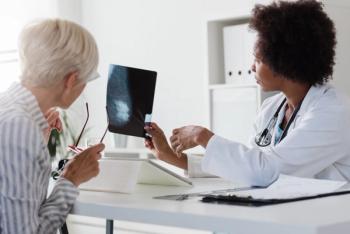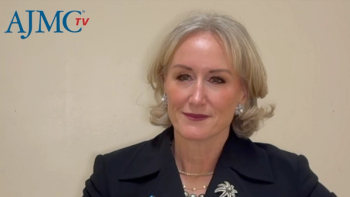
SOPHIA Trial in R/R HER2+ mBC
A review of the phase III SOPHIA trial on margetuximab vs trastuzumab for the treatment of relapsed/refractory HER2+ metastatic breast cancer.
Transcript
Hope S. Rugo, MD: I wanted to mention the other phase III trial that was presented at ASCO [the American Society of Clinical Oncology annual meeting] 2019 and also updated at the San Antonio Breast Cancer Symposium. This was the SOPHIA study, and it looked at a novel HER2 [human epidermal growth factor receptor 2]-targeted antibody with chemotherapy versus trastuzumab and chemotherapy in patients who had received prior pertuzumab. About 90% of these patients had received prior T-DM1 [trastuzumab emtansine]. Margetuximab is an Fc engineered antibody. There are different IgG [immunoglobulin G] Fc gamma receptors, and the Fc portion of the antibody binds to the receptor.
Some have more affinity for the antibody, some have lower affinity for the antibody. This particular engineering was designed to try to increase the binding for the low affinity activating Fc gamma receptor, which is CD16a, and decrease affinity for the inhibitory Fc gamma receptor. It's actually interesting because it’s an engineering of an antibody to try to activate the immune response, and that's been shown in preclinical studies. SOPHIA randomized these patients who had heavily pretreated disease to receive margetuximab or trastuzumab with a chemotherapy. The central blinded analysis progression-free survival was significantly longer, but the difference was only 0.9 months with a P value of .03.
You meet an end point, but the difference is very narrow in terms of the clinical impact. We actually had updated the investigator assessed progression-free survival as of September of 2019, and in that, the difference was a little broader with an absolute difference that was more than 1 month. But it's still pretty narrow. The hazard ratio was a little bit better. The drug is very well tolerated, but the greatest interest in margetuximab was looking to see what happened in patients who had this low affinity IgG Fc gamma CD16a genotype, which is called F, the allele F. Either you would be homozygous or heterozygous for F. If they looked at this group of patients for progression-free survival and overall survival, it looked like you really widened the gap.
In other words, the improvement of margetuximab appeared to be primarily in this group of patients who have a low affinity F genotype. They are very interesting data, but difficult to understand exactly how it's going to play a role in terms of all of these other therapies. It still may play a role in the later-line setting. Then there is a lot of interest in setting the antibody specifically in patients who have the F allele, which is actually a large majority of patients, so it’ll be interesting.
Claudine J. Isaacs, MD: One of the things that you're alluding to there is up front, looking at the patients who are less likely to respond to trastuzumab because their tumor has the allele that makes them less sensitive to that therapy. So instead of trying in the later line setting like the SOPHIA trial was, perhaps moving this up earlier, we might actually see greater benefits.
Hope S. Rugo, MD: That is a proposed trial, actually, from Dana-Farber Cancer Institute by Ian E. Krop, MD, PhD, to look specifically at patients who have the F allele and randomize them to margetuximab or trastuzumab because we’ve certainly learned that margetuximab was as good. In a phase I trial some patients stayed on margetuximab for over 4 years, and they were heavily pretreated with refractory disease. I think it's worthwhile pursuing and looking more to try to understand where to place this in our armamentarium for HER2-targeted therapies, and of course we're still waiting for the final overall survival analysis from that trial as well.
Newsletter
Stay ahead of policy, cost, and value—subscribe to AJMC for expert insights at the intersection of clinical care and health economics.








